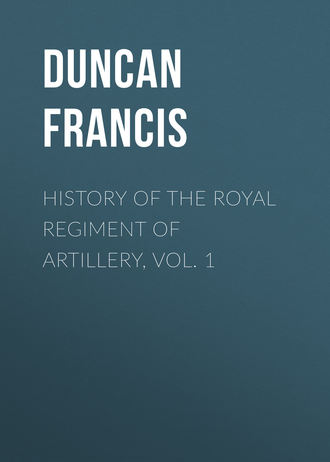 полная версия
полная версияHistory of the Royal Regiment of Artillery, Vol. 1
Now "B" BATTERY, 8th BRIGADE.

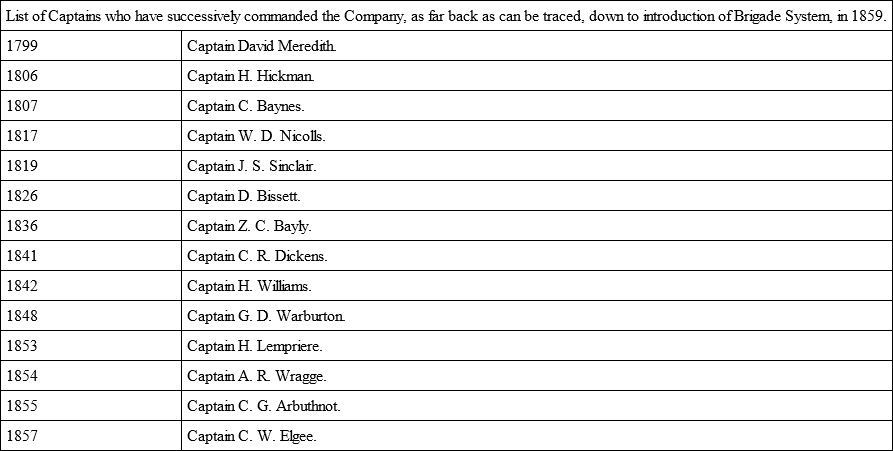
No. 5 COMPANY, 6th BATTALION,
Reduced in 1819.

* Thanked in Orders by Sir S. Achmuty.

No. 6 COMPANY, 6th BATTALION
(Became No. 5 on that Company being reduced in 1819),
Now "C" BATTERY, 8th BRIGADE.
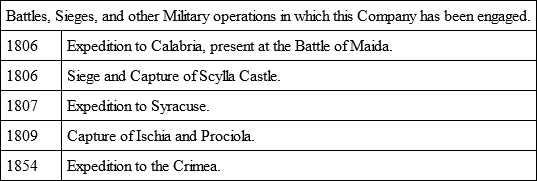
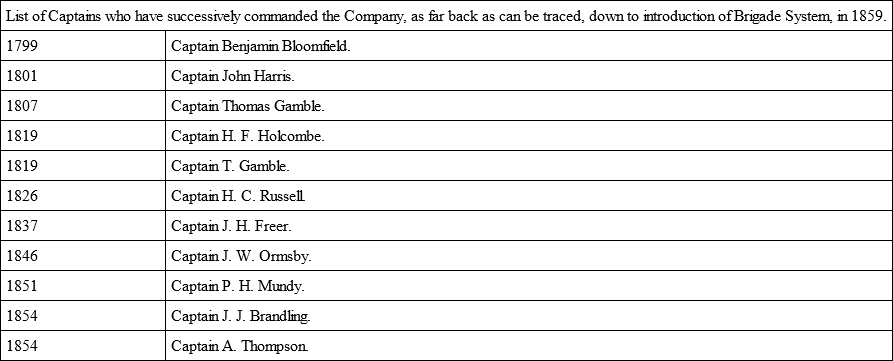
No. 7 COMPANY, 6th BATTALION
(Afterwards No. 6 Company),
Now "F" BATTERY, 8th BRIGADE.
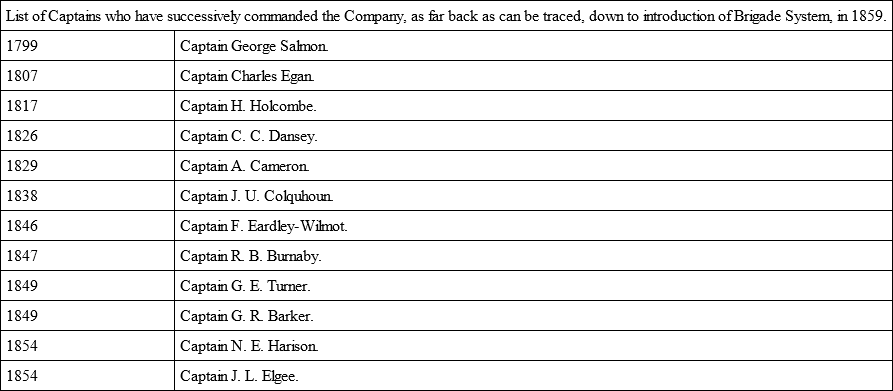
No. 8 COMPANY, 6th BATTALION,
Reduced in 1819.

No. 9 COMPANY, 6th BATTALION
(Afterwards No. 7),
Now "C" BATTERY, 9th BRIGADE.

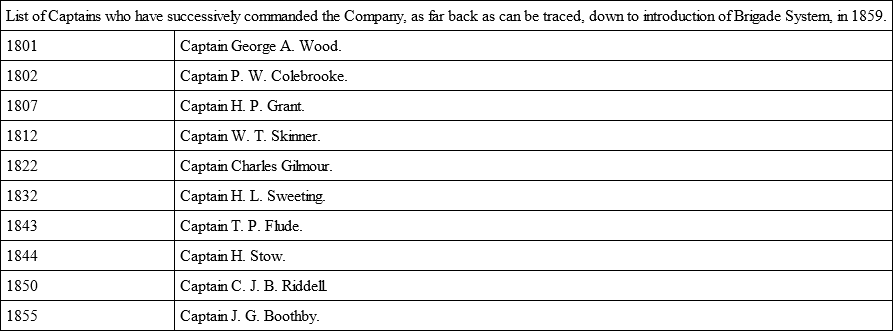
No. 1 °COMPANY, 6th BATTALION
(Afterwards No. 8 Company),
Now "5" BATTERY, 3rd BRIGADE.

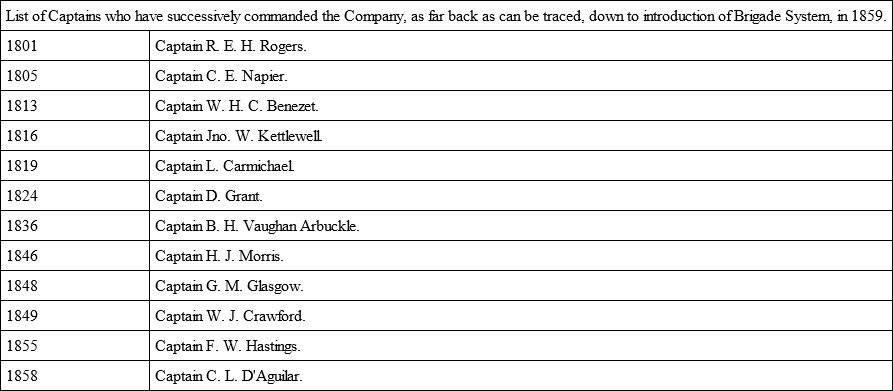
The Seventh Battalion of the Royal Artillery was formed on the 1st April, 1801. The Act for the Union between England and Ireland received the Royal assent on the 2nd July, 1800, and came into force on the 1st January, 1801. From this measure arose, as has been mentioned in a former chapter, the incorporation of the Royal Irish Artillery with the older Corps; and it was transferred as the Seventh Battalion of the Royal Artillery, consisting, at the date of transfer, of ten companies, with a proportion of Field and Staff officers. The incorporated officers took rank according to the dates of their respective commissions; but they were also allowed the option of retiring on full pay, or of taking commissions in the Line. The non-commissioned officers and gunners who were approved for transfer received each a bounty of three guineas.
The following table shows the proportion of ranks, total numbers, and rates of daily pay, in the Battalion when first formed.
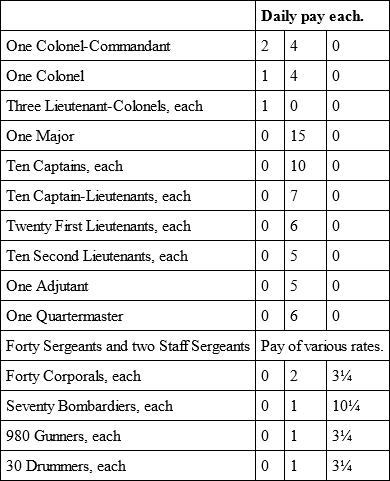
Some of the companies were in the West Indies when the transfer was effected; and on reference to the appended list it will be seen that much of the active service of the Seventh Battalion was carried on in these islands. It was in connection with West Indian service that the Battalion obtained a distinctive mark, as containing among its companies one known always, until the Brigade system was introduced, as
"The Battle-Axe Company."The story of the circumstances under which this title was earned is worthy of reproduction. The company in question was originally No. 8 of the 7th Battalion, but in the year 1819, No. 7 Company being reduced, No. 8 became No. 7. Under the altered nomenclature of 1859, it became and now is
No. 2 Battery, 5th BrigadeIn the year 1808 the company was quartered in Halifax, Nova Scotia. In December of that year it was ordered on an expedition for the capture of Martinique; forming part of the force under Sir George Prevost, which included the 7th Fusiliers, 8th King's, and 23rd Royal Welsh Fusiliers.
The force arrived at Martinique on the 30th January, 1809, and remained brigaded together during the attack, quite distinct from the West Indian division under General Maitland, which had arrived in company with Admiral Cochrane and his fleet. On the 2nd February, 1809, the French met the Halifax brigade under General Prevost, about half-way between the bay where they landed and the town, but were driven back with considerable loss. In one day, this company prepared and armed a battery of six 24-pounders, and four 10-inch mortars, and opened fire on the day following. On the 24th February the Garrison capitulated, for "the British Artillery was so well served, that most of the Fort guns were quickly dismounted."50 The officers of the company were assembled by the General to consult as to what should be bestowed on the company as a reward of bravery and good conduct. It was first contemplated to give a one-pounder French gun, beautifully mounted, but the officers, knowing that the company was about to return to Halifax, and a war with America likely to take place, when they would be unable to take the gun with them, chose an axe and a brass drum. A brass eagle was affixed to the axe, which was always carried by the tallest man in the company, who in virtue of his office was permitted to wear a moustache.
This version of the story was committed to paper by one who was present with the company at Martinique, Master-Gunner Henry McElsander, who joined it three years after the amalgamation, and remained in it until promoted to be Sergt. – Major at the Royal Military Academy, Woolwich. It is completely corroborated by the Records of the Seventh Battalion, from which the further history of the company may be obtained. It returned to Halifax in April, and remained in that station until May, 1813, when it sailed for Quebec. It served in the campaigns of 1813 and 1814 in Canada. In the winter of the former year it was collected in Kingston, Upper Canada, watching the enemy. Acting-Bombardier James Keating, being detached with seven gunners to Michilimackinac, distinguished himself in an affair with the enemy, and his conduct was rewarded by a commission from the Provincial Government. The company was present at the operations against Fort Erie in August, 1814, and at the enemy's attack on the English position before that place on the 17th September. It was also engaged in the defence of the Log Bridge on the Chippawa. The two officers present with the company during these hostilities, Captain Walker and Lieutenant Carter,51 were specially mentioned in despatches, and received permission to wear "Niagara" on their appointments. The company returned to Woolwich in 1823, and in 1831 again proceeded on foreign service to the West Indies, whence it returned in 1837. Its only additional foreign service prior to the introduction of the Brigade system was at Gibraltar, where it served from January, 1845 to January, 1851, and to which station it again proceeded in May, 1855.
The history, present designation, and succession of Captains, of all the companies, will now be given.
No. 1 COMPANY, 7th BATTALION,
Now "C" BATTERY, 1st BRIGADE.

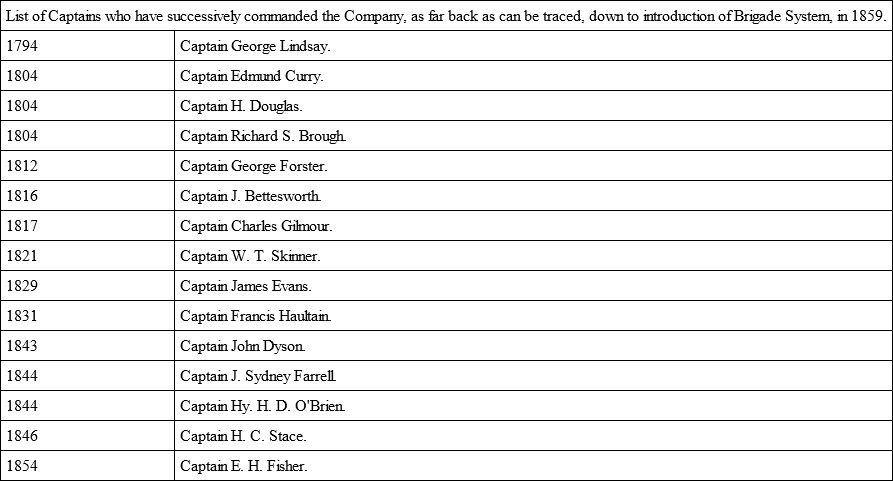
No. 2 COMPANY, 7th BATTALION,
Became 1 Company, 3rd Brigade; was afterwards reduced; the non-commissioned officers and men being formed into
"I" BATTERY, 1st BRIGADE.

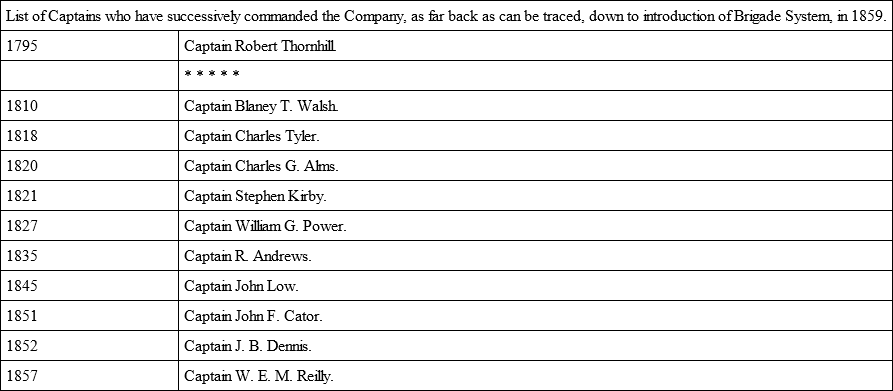
No. 3 COMPANY, 7th BATTALION,
Now "3" BATTERY, 12th BRIGADE.

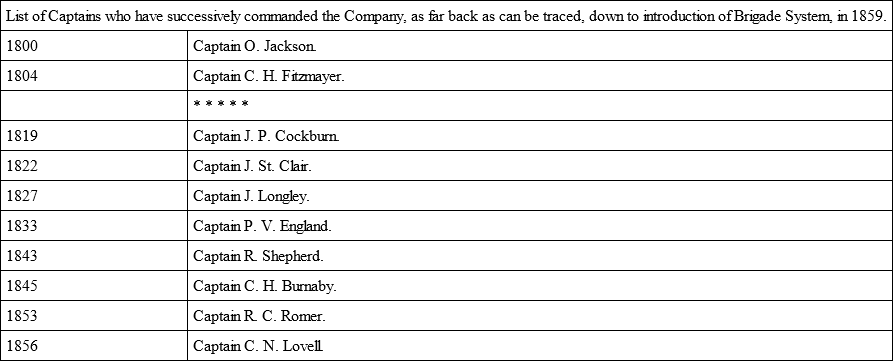
No. 4 COMPANY, 7th BATTALION,
Now "A" BATTERY, 1st BRIGADE.

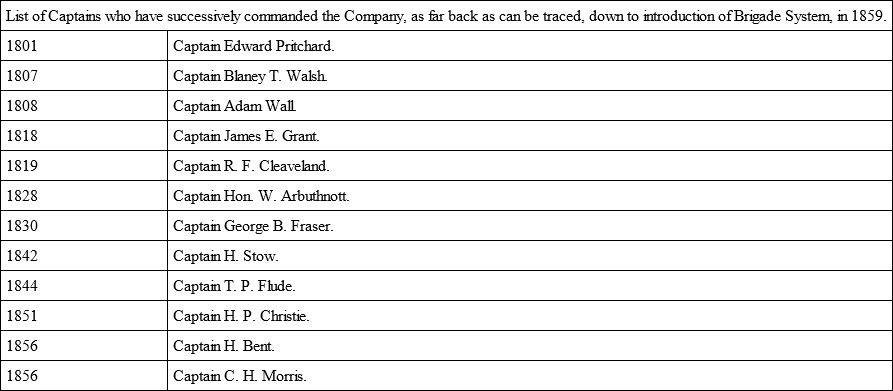
No. 5 COMPANY, 7th BATTALION,
Now "3" BATTERY, 6th BRIGADE.


No. 6 COMPANY, 7th BATTALION,
Now "D" BATTERY, 11th BRIGADE.
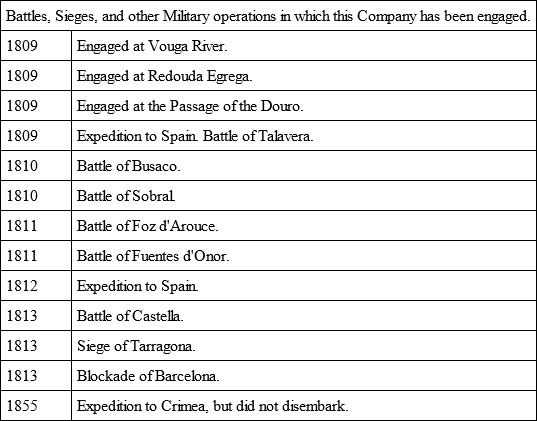
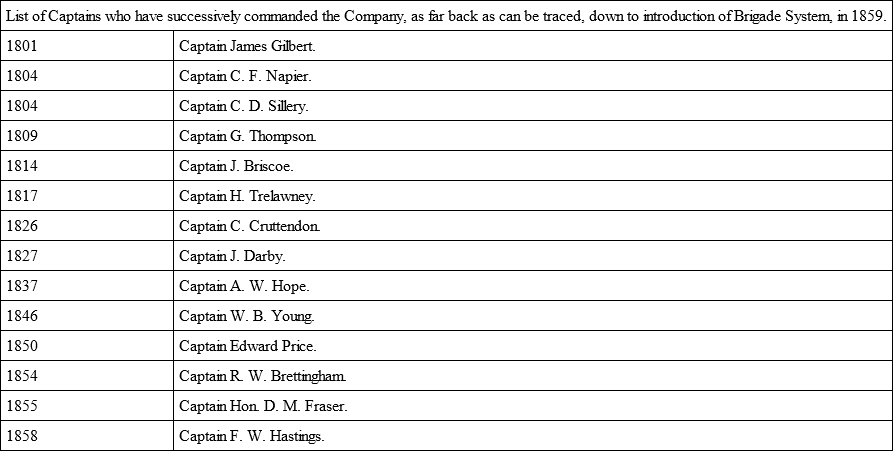
No. 7 COMPANY, 7th BATTALION,
Reduced 1st March, 1817.


"The Battle-Axe Company."
No. 8 COMPANY, 7th BATTALION
(Became No. 7 on that Company being reduced),
Now "2" BATTERY, 5th BRIGADE.

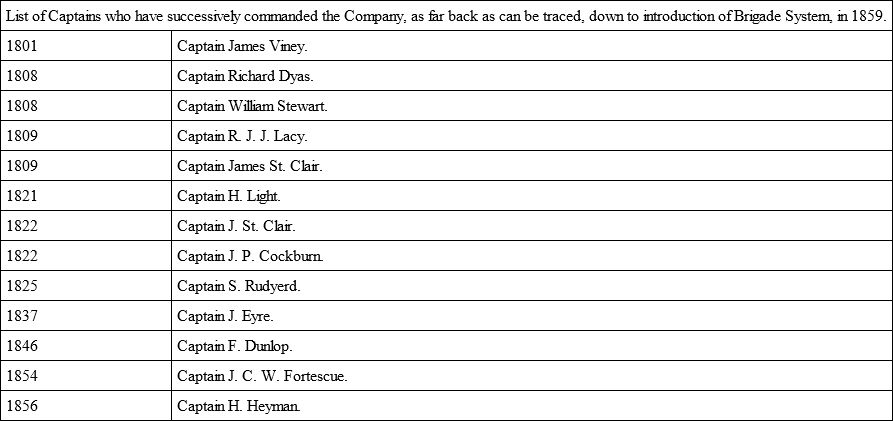
No. 9 COMPANY, 7th BATTALION
(Became No. 8 on that Company being reduced),
Now "K" BATTERY, 4th BRIGADE.

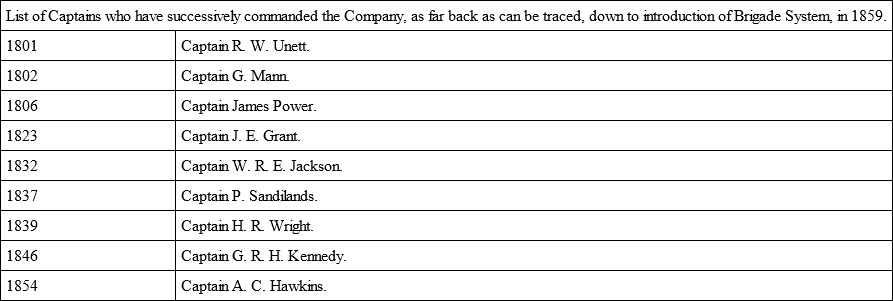
No. 1 °COMPANY, 7th BATTALION,
Reduced 1st February, 1819.


N.B.– In the lists of the Captains who commanded the various companies, the names and titles borne by them at the date they commanded have alone been given. Very many of these officers afterwards received distinguishing titles and orders, – but it would not have been historically correct to anticipate their receipt of such honours.
APPENDICES
APPENDIX No. 1.
Chap. IV. – Page 60
ROYAL WARRANT. Dated 22nd August, 1682CHARLES R.
Whereas our Royal progenitors established the number of 100 gunners with a yearly fee payable out of the Exchequer and finding that divers of them were such as were not taught nor trained up in the practice and knowledge of the Art of Gunnery but men of other Professions and that by reason of their receiving their fees by virtue of their patents out of the Exchequer they did not attend according to their duties as well for performance of Our Service as to be exercised and trained up in that Art by Our Master Gunner at such time as they were required thereunto and also that the places of such Gunners and Mattrosses were commonly bought and sold to such as would give most money though very unfit for the said Employments whereby great inconveniences and disappointments were occasioned for prevention whereof We thought fit to Authorize Sir William Compton sometime Master of Our Ordnance, by Our Warrant under Our Sign Manual and Privy Signet, dated 2nd January, in the twelfth year of Our Reign from time to time to grant his Warrant to such person or persons as he should find fit and able to be Entertained as fee'd Gunners in Our Service and Order that the future payments of their respective fees should be placed upon and made good to them out of Our Ordinary and entered into the quarter books of Our Office and likewise We did empower Sir Thomas Chicheley late Master of Our Ordnance by Our like Warrant bearing date 16th January in the 22nd year of Our Reign to cause Our Master Gunner or such other person as he should think fit to examine all the Gunners and Mattrosses then employed within Our Kingdom of England Dominion of Wales or town of Berwick-on-Tweed commanding them to be subject to him and the Successive Masters of Our Ordnance for the time being and that if he should find any of the said Gunners or Mattrosses unfit or unable to execute their several places he or they should remove or cause them to be removed or dismissed from their said employment and after such removal or after the death resignation or voluntary departure of any such Gunner or Mattross to commissionate and empower such Gunners or Scholars as should be certified by Our Master Gunner of England to be able to execute the duty of a Gunner or Mattross in the place or places of such as should by him or them be removed or be dead or have voluntarily resigned without any fees or reward except Common Fees: —
And whereas on the 8th day of February last the Lords appointed a Committee to inspect and examine the present state and condition of the Tower have represented unto Us that whereas the number of the Gunners which belong to the Office of the Ordnance is One hundred whose pay is sixpence per day each and many of them of other trades and not skilled in the Art of Gunnery and that it was their opinion that if this number were reduced to sixty effective men whose pay might be twelve pence per diem and they required to lodge in the Tower and duly exercised that it would be much more useful for Our Service. Upon due consideration of all which We have thought fit to dissolve the said number of One hundred Gunners and do declare they are hereby dissolved and that the said number from henceforward shall be reduced to the number of sixty effective men and no more and we do by these empower authorize and appoint Our right trusty and well-beloved Councillor George Legge Esq. Master-General of Our Ordnance to elect sixty good able experienced and sufficient men for Gunners and three Mates to Our Master Gunner of England to be chosen out of the best Gunners or fittest or ablest men for Our Service and to allow each Gunner twelve pence per diem and to each Mate 2s. 6d. per diem.
And to the end that the said Gunners and Masters may be bound to a more strict performance of their duty Our Will and Pleasure is and We do hereby Authorize and empower Our said Master-General of Our Ordnance from time to time to grant his Warrant to such person or persons as he shall choose qualified as aforesaid for whose encouragement We hereby direct and appoint that the said allowance to the said Gunners of twelve pence per diem and to the said Mates of 2s. 6d. per diem be placed and made good to them out of Our Ordinary of Our Said Office of Our Ordnance and that an order thereunto shall be entered into the quarter books of the said Office without paying any fees or reward excepting only the Ordinary fees for drawing and recording the said Warrants or Commission in Our said Office. And We further require and direct that the said Gunners to be chosen as aforesaid be constantly exercised by Our Master Gunner of England once a week in winter and twice a week in summer and to be kept to their duty either in Our Tower of London or in whatever other place or places they shall by you Our Master General of Our Ordnance be thought fit to be disposed hereby requiring and commanding all the said Gunners and Mates to observe and obey such Orders and directions as shall be given unto them by Our said Master General or by any other Master General of Our Ordnance for the time being or the Lieutenant General of Our Ordnance and the principal Officers of Our Ordnance in your Absence for the better behaviour of themselves in Our Service. And We do hereby further Authorize and empower you the said George Legge M.G.O.R.O. and the Successive Masters of the said Office for the time being if he or they shall find the said Gunners or Mates unfit or unable to execute their several and respective places from time to time to remove or cause them to be removed and dismissed from their said several and respective places and to place others fitly qualified for such Employment in their several and respective places.
And as for all other Gunners of Garrisons Forts Castles Blockhouses or Bullworks or Traines that are or shall be appointed You are to govern yourself as by Our Warrant bearing date 6th January 1671 &c. &c.
By His Majesty's Command.
(Signed) Conway.
To Our Right Trusty and Well-beloved Councillor
George Legge Esq. M.G.O.
APPENDIX No. 2.
Chap. IV. – Page 61
Royal warrant establishing a Regimental Train of Artillery, to be composed of officers and men who had served on the old and new Establishments, and chiefly to find employment for Artillerymen who had served under William III. in his trains in Flanders.
WILLIAM R.
Whereas Wee have thought fitt to dismiss as well the Trayne of Artillery that hath Served Us during the late Warre in Flanders as also the several Traynes that have been employed in Our Service by Sea, Yet that such persons as have served Us well and faithfully during the Warr might have some reasonable provision made for their subsistence in time of peace And for having a Trayne of Artillery in greater readiness to march upon any occasion for the necessary defence of Our Realme and Dominions Wee have thought fitt to direct that a Small Trayne of Artillery should be composed of such persons as had served Us well in ye said Trayne durying the Warr. And the Annexed Scheme of such a Trayne of Artillery having been accordingly prepared and laid before Us for Our approbation. Wee have perused and considered thereof and do hereby approve of and establish ye same to be entertayned in Our Service and kept in Our pay in time of peace untill such tyme as Wee shall think fitt to signify Our further pleasure therein. Our Will and Pleasure therefore is And Wee do hereby authorize and direct yt out of such money as shall at any time be paid into the Treasury of Our Ordnance on accompt of Land Service to cause the severall sums and yearly allowances mentioned in ye said Annexed Scheme amounting in ye whole to Four Thousand Four Hundred Eighty-Two Pounds and Tenn Shillings to be paid to the respective Officers Engineers Gunners and others therein mentioned the said allowances to commence from the fifth day of this instant May and to be continued durying Our pleasure And Wee do hereby further Authorize and Empower ye as often as any Occasion shall happen on this Our Establishment by the Decease of any person now placed there upon or otherwise to fill up the same with such persons as have served in any of the above mentioned Traynes and could not at present be provided for or with such other persons as shall apply themselves to study the Mathematicke and duly qualify themselves to serve as Engineers Fireworkers Bombardiers or Gunners on Our said Establishment. And for so doing this shall be as well to ye as the Auditors of Our Imprest and all other Our Officers therein concerned a sufficient Warrant Given at Our Court at Kensington this 24th day of May 1698 in ye tenth year of Our Reign.
By His Majesty's Command.
Ja. Vernon.
To Henry, Earle of Romney, M.G.O.
A Regimental Trayne of Artillery to consist of Field Officers and four Companies of Gunners wth Engineers, Firemasters, Fireworkers, and Bombardiers as followeth: —
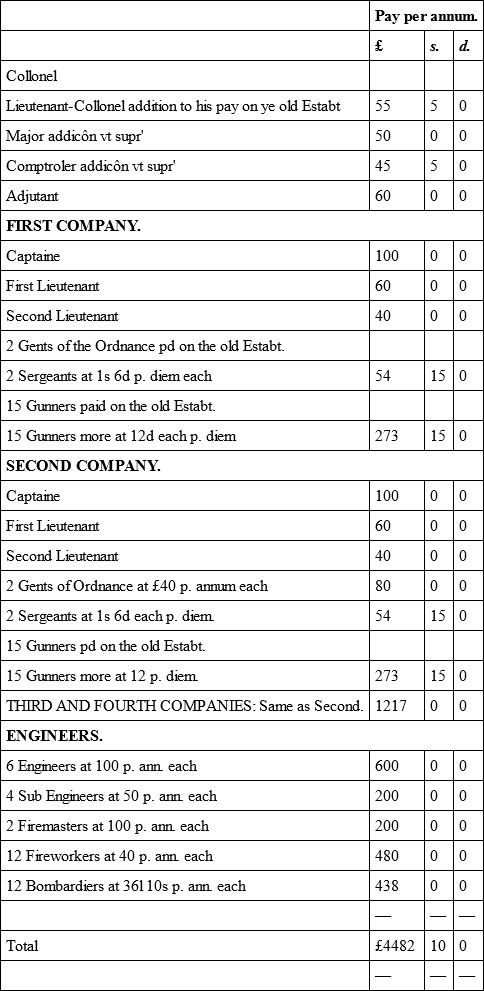
Names of Officers of William's Peace Train. 1698.
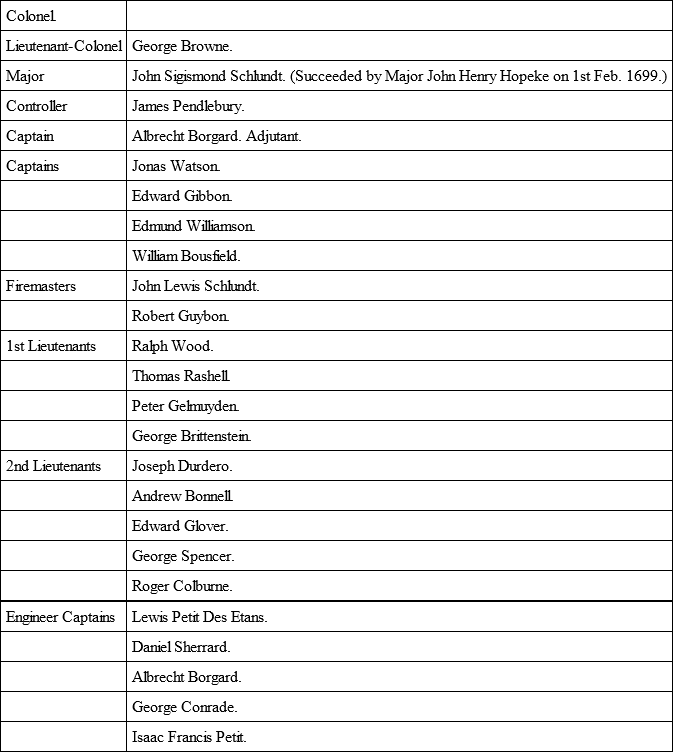
On 14th Feb. 1699, an addition to the Regt. was made of —
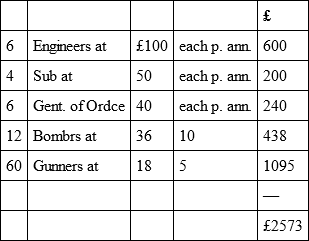
(Sd. Romney.)
APPENDIX No. 3.
Chap. VII. – Page 81
ROYAL WARRANT for the establishment of two Companies of Artillery, dated 26th May, 1716. These companies were never reduced, and represent the infancy of the Royal Regiment of Artillery.
GEORGE R.
Whereas Our Right Trusty and Right entirely beloved Cousin and Councillor John Duke of Marlborough Master General of Our Ordnance hath laid before Us a representation of Our Principal Officers of Our Ordnance setting forth the inconveniences and defects of the present Establishment of the Military Branch of Our said Office amounting to 16,829l. 11s. 3d. and therewith a scheme showing that a greater number of Gunners Engineers and other proper Officers may be maintained for less than the present expense. And whereas by Our Warrants of the 27th November 1715 two Companies of Gunners and Mattrosses were raised for the service of Our Artillery sent upon the late Expedition to North Britain and having been found always necessary that a sufficient number of Gunners with proper Officers should be maintained and kept ready for Our Service. And whereas it has been represented unto Us by Our said Master General of Our Ordnance that there are several salaries now vacant of the present old Establishment which are not useful and that other savings may be made by which part of the two said Companies may at present be maintained. It is our will and pleasure that the said vacancies and savings be immediately applied for the payment and maintenance of one Sergeant three Corporals thirty Gunners and thirty-two Mattrosses being such as have served well abroad during the late Wars and are not otherwise provided for and as other salaries shall become vacant in the said military branch that you apply the same to complete the pay of the rest of the Officers and others according to the annexed list, which with their respective pays We do hereby approve and establish and for so doing this shall be as well to you as to the Auditors of Our Imprest and all other Officers concerned a sufficient Warrant. Given at Our Court of St. James's this 26th day of May 1716 in the second year of Our reign.
By His Majesty's Commands
(Signed) James Stanhope.
To Our Right Trusty and Right Entirely beloved Cousin and Councillor John Duke of Marlborough, Master-General of Ordnance.
Establishment for two Companies of Artillery with their respective pays and employments: —
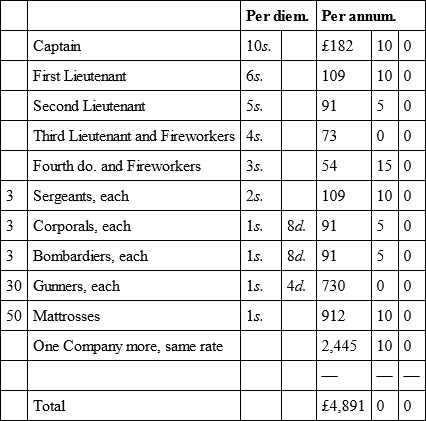
APPENDIX No. 4
An account of the Master Gunners and other Gunners upon the Establishment of Guards and Garrisons for the year 1720, with a proposal for some alterations more advantageous to the Service, without exceeding the sum granted for that purpose: —
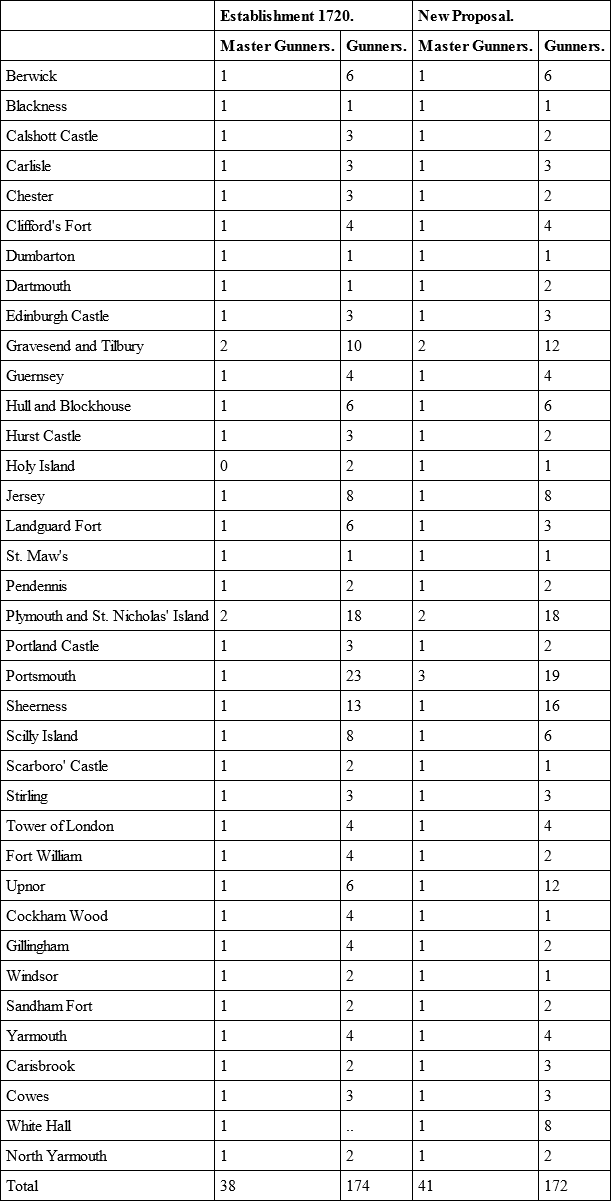
Establishment of the year 1720, compared with that proposed for the year 1721: —
ESTABLISHMENT FOR THE YEAR 1720.
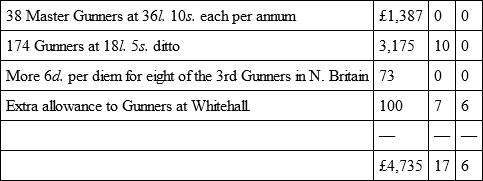
ESTABLISHMENT PROPOSED FOR THE YEAR 1721.

